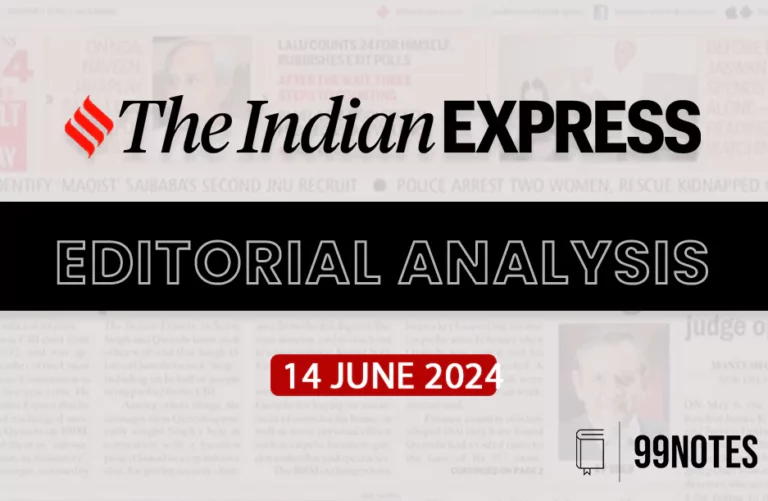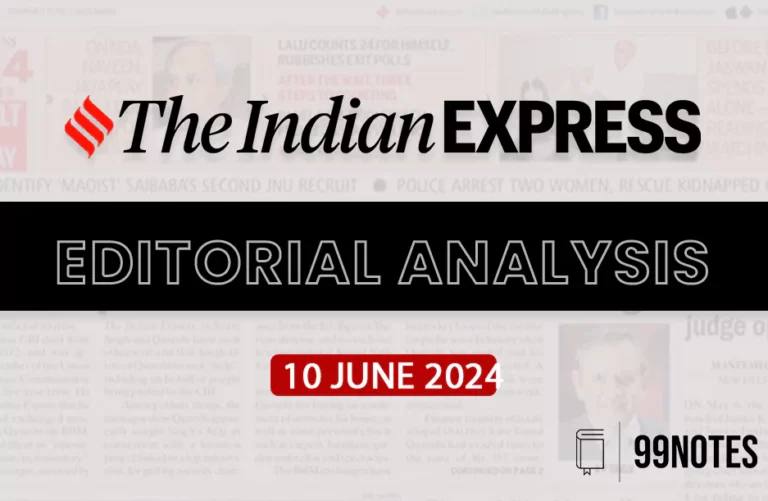17 Jan 2024 : Indian Express
Indian Express
17- January-2024
1. Davos Man & Global South
| Topic: GS2 – International Relations – Regional and global groupings This topic is relevant for both Prelims and Mains in the context of International Relations and Global Politics. |
| Context: |
|
Davos: The Unraveling of Globalism
The Davos Man and the Era of Globalism:
- The world’s elite are at Davos for a meeting that shows a sober acknowledgement of the upheavals brought about by economic nationalism and resurgent great power conflicts.
- The Washington Consensus and globalisation, which defined the post-Cold War era, allowed for the free flow of labour, capital, products, and services.
- Nevertheless, the planned peaceful world order has been upset by recent geopolitical developments, such as the conflict in Ukraine and the alliance between China and Russia.
Challenges to Davos Man’s Worldview:
- There have been several obstacles to the globalised philosophy of the Davos Man, which has ruled the globe since the 1990s.
- The emergence of nationalistic beliefs, personified by the election of Donald Trump in 2016, and the ensuing “greenlash” against climate change policies have highlighted the shortcomings of the Davos agenda.
- While focusing on national interests and recalibrating global economic goals, Joe Biden’s presidency has not entirely reversed these tendencies.
Future Challenges for Davos
- Defying its conventional mission, Davos must adapt to a swiftly changing world as Trump runs for reelection and promises a return to nationalism.
- Trump’s possible comeback points to an ongoing conflict between nationalist and globalist forces.
NAM and G77: The Limits of Political Enthusiasm
Renewed Political Enthusiasm for the Global South
- There is a newfound political passion for the Global South during the NAM and G77 conferences in Kampala.
- But for these organisations, which have always championed solidarity and collective bargaining but have struggled to make significant progress, this enthusiasm hasn’t yet translated into real results.
Undermining Factors: Rise of Regionalism
- The emergence of regionalism in the Global South has diminished the power of the NAM and G77.
- The importance of regional organisations like the African Union and ASEAN has increased, and the BRICS alliance has appropriated elements of the former NAM and G77 agenda, undermining their continued relevance.
- Even though China is not a traditional member, its active participation in both forums adds complexity to the outdated North-South paradigm.
China and India: Adapting to Structural Shifts
- China uses projects like the Belt and Road Initiative (BRI) to alter the global order on its terms, positioning itself as the defender of the Global South.
- India aims to promote integration and reform while navigating global developments, highlighting its traditional position in the NAM and G77.
- Both countries see the need to adjust to changing institutions and strive for more influence in the Global South.
India and China at Davos and Kampala: Divergent Objectives
Engagement at Both Summits
- In an effort to boost interaction, ministerial representatives from China and India will be present in Davos and Kampala.
- Both countries are looking for Western finance in Davos, but their goals are very different.
China’s Ambition to Revise the Global Order
- In Kampala, China challenges US supremacy by presenting itself as an alternative to the current global system.
- Beijing is highlighting its position as a significant global player in an attempt to alter the global economic system to its advantage.
- India’s Focus on Integration and Reform
- In Kampala, however, India presents itself as a link between the North and the South.
- Rather than questioning the tenets of the current global order, its emphasis is on integration and reform within it.
- India hopes to contribute positively to the changing dynamics of international politics.
Conclusion:
- The simultaneous summits in Kampala and Davos highlight the dynamic and complexity of the world political scene in 2024.
- The difficulties Davos had in adjusting to a changing global order and the shortcomings of the NAM and G77 in converting political fervour into real progress underscore the necessity for big global entities such as China and India to be flexible and strategically positioned.
- These summits offer a window into the different paths countries are pursuing in response to the shifting geopolitical landscape as the globe struggles with structural changes.
| Practice Question: Discuss the implications of the simultaneous summits in Davos, Switzerland, and Kampala, Uganda, in the context of the shifting global political landscape in 2024. (200 words/12.5 m) |
2. A DATED URBAN VISION
| Topic: GS1 – Society – Urbanization, their problems and their remedies. This topic is not much relevant in the context of Prelims but more for Mains in the context of Mumbai Trans-Harbour Link and its implications for urban planning. |
| Context: |
|
Traffic Generation and Climate Crisis
- According to the analysis, the bridge and the coastal road are examples of an antiquated style of city-making that, in addition to creating traffic (as research findings demonstrate), also plays a role in the local production of the climatic catastrophe.
- It draws attention to the negative effects of a growth paradigm that gives infrastructure developments that serve individual cars priority over others, creating environmental problems and escalating the climate crisis.
Promise in Planning Failures:
- Although planners criticise the slow rate of implementation of city plans in Mumbai, one encouraging element is seen.
- Open spaces, wetlands, gardens, and playgrounds that presently provide essential services for climate mitigation and adaptation have been maintained as a result of development plans not being carried out quickly enough.
- The city’s delayed urbanisation is responsible for these spaces’ availability.
Consequences of Concretization and Infrastructuring
- Although the analysis acknowledges the advantages of delayed urbanisation for the environment, it criticises the recent rush of quick infrastructure and concretization projects.
- It is alleged that engineers and planners have overlooked how reliant the city and its residents are on the environment.
- The unfavourable effects, like worsening air quality and more precipitation runoff, are viewed as proof of poor planning decisions based on antiquated concepts from the 1960s.
Reimagining Infrastructure Planning for the Present and Future
- According to the article, infrastructure planning needs to be rethought in light of the city’s altered environment.
- It exhorts planners to take into account the dire state of the air and evaluate the vital functions that the remaining open areas, intertidal zones, and mangroves provide.
- Prioritising the urban social and ecological conditions of the twenty-first century is advised rather than racing to complete outdated designs from the past.
Conclusion:
- Mumbai’s infrastructure development is moving at a historically slow rate, which is viewed as a chance to abandon outdated planning concepts.
- The article argues that paradigms in urban planning should evolve, highlighting the significance of environmentally conscious, context-specific strategies that tackle the problems brought on by climate change.
- Planners should imagine 21st-century urban futures that are in line with specific demands rather than following designs that have their roots in the past.
| PYQ: With reference to the role of UN-Habitat in the United Nations programme working towards a better urban future, which of the statements is/are correct? (2017) 1. UN-Habitat has been mandated by the United Nations General Assembly to promote socially and environmentally sustainable towns and cities to provide adequate shelter for all. 2. Its partners are either governments or local urban authorities only. 3. UN-Habitat contributes to the overall objective of the United Nations system to reduce poverty and to promote access to safe drinking water and basic sanitation. Select the correct answer using the code given below: (a) 1, 2 and 3 (b) 1 and 3 only (c) 2 and 3 only (d) 1 only Ans: (b) |
| Practice Question: Critically analyze the urban planning paradigm in the context of the recently inaugurated Mumbai Trans-Harbour Link (Atal Setu). (150 words/10 m) |
For Enquiry

13 Feb 2024 : Daily Current Affairs Quiz

13 Feb 2024 : Daily Answer Writing

13 Feb 2024 : Daily Current Affairs

13 February 2024 : The Hindu Editorial Notes PD

13 Feb 2024 : Indian Express Editorial Analysis

13 February 2024 : PIB Summary for UPSC

12 Feb 2024 : Daily Current Affairs Quiz

12 Feb 2024 : Daily Answer Writing

12 Feb 2024 : Daily Current Affairs

12 Feb 2024 : Indian Express Editorial Analysis
Daily Quiz 13 Feb 2024 : Daily Current Affairs Quiz 13 Feb 2024 : Daily Quiz…
mains answer writing 13 Feb 2024 : Daily Answer Writing Mains Answer Writing
13-February-2024
Q1) With the help of a map, show major ocean currents of the world….
Daily Current Affairs 13 Feb 2024 : Daily Current Affairs Daily Current Affairs
13-February-2024- Top News of the Day
1. Indian Navy Personnel Released from Custody…
Feb 2024 The Hindu 13 February 2024 : The Hindu Editorial Notes PD The Hindu Editorial
13-February-2024
1. A global alliance to bridge the gender equity gap
Topic:…
Indian Express 13 Feb 2024 : Indian Express Editorial Analysis Indian Express Editorial Analysis
13-February-2024
1. A science for us
Topic: GS2 – Governance…
feb 2024 PIB 13 February 2024 : PIB Summary for UPSC PIB Summary for UPSC
13-February -2024
1. Union Minister G Kishan Reddy inaugurate regional centre…
Daily Quiz 12 Feb 2024 : Daily Current Affairs Quiz 12 Feb 2024 : Daily Quiz…
mains answer writing 12 Feb 2024 : Daily Answer Writing Mains Answer Writing
12-February-2024
Q1) “Water scarcity threatens economic and social gains…
Daily Current Affairs 12 Feb 2024 : Daily Current Affairs Daily Current Affairs
12-February-2024- Top News of the Day
1. Great Indian Bustards give Nandyal a…
Indian Express 12 Feb 2024 : Indian Express Editorial Analysis Indian Express Editorial Analysis
12-February-2024
1. CLASSROOM VS COACHING
Topic: GS2 – Social…



